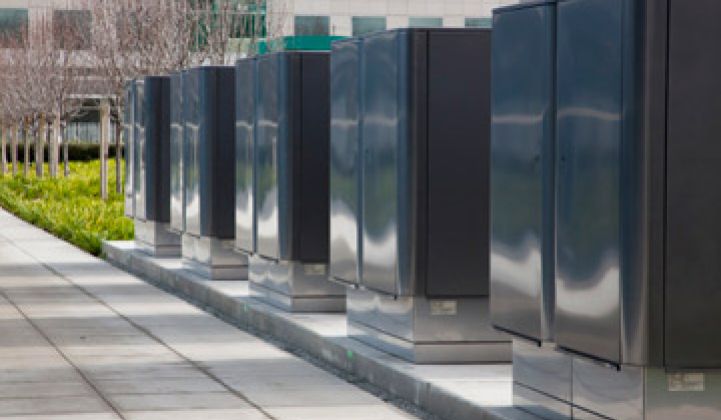PowerSecure, the microgrid and backup-power provider bought by utility Southern Company earlier this year, is putting its money and technology into behind-the-meter fuel cells from Bloom Energy -- and trying out a fuel cell-battery combo in a select set of Home Depot stores to keep them running when the grid goes down.
On Tuesday, these companies announced a strategic alliance that comes with a commitment from PowerSecure to acquire 50 megawatts of Bloom’s fuel cells. PowerSecure will offer them to its commercial and industrial customers through no-money-down installations, and sell the power they generate under long-term power-purchase agreements (PPAs) that lock in favorable prices for years to come.
Customers that have already signed up for the deal include Home Depot, which is planning to add 60 stores to the 140 stores now using Bloom fuel cells, and another customer -- likely existing Bloom customer Kaiser Permanente -- that will deploy 30 megawatts “supporting hospitals, clinics and administrative centers.”
The 50-megawatt financing commitment isn’t a first for Bloom, which has raised about $1.2 billion and is reported to have filed IPO plans. The Sunnyvale, Calif.-based company has been offering no-money-down financing and PPAs for some time, through its Bloom Electrons offering and its 40-megawatt deal with Exelon. PowerSecure and Bloom's new offering is its third, and will target California, New Jersey, Massachusetts, Connecticut and New York, Asim Hussain, Bloom’s vice president of customer marketing, said in an interview.
It also includes the first installations of a new ”integrated fuel cell and energy storage solution" that can expand the business cases for Bloom’s systems by adding the flexibility of batteries, he said. These combo units, designed and built by PowerSecure and containing both fuel cells and batteries behind the same inverter and interconnection and protection gear, will first be tested out with Home Depot, he said -- a customer that's interested in cost-effective systems to keep key stores running in the event of blackouts or storm-caused power outages.
Bloom’s existing commercial and industrial customers usually size their installations to provide 50 percent to 70 percent of their overall load profile, Hussain said. Adding batteries allows the energy generated during off-peak hours to be stored up for when it's needed, and sized so that “in an outage, [the technology] can carry the entire load of the store,” or at least critical loads like lights and HVAC.
PowerSecure is taking the lead role in setting up these critical backup power systems, since that’s its bread-and-butter business, with about 1,500 megawatts of flexible, behind-the-meter energy resources at about 1,200 sites as of this summer. The company was bought by Southern Co. for $431 million in February.
Beyond backup power, Bloom has been getting inquiries from customers about integrating behind-the-meter batteries to help reduce demand charges, he noted. “We already serve 25 of the Fortune 100. They’re having to go to market separately to get their storage, with separate business cases -- not a lot of efficiencies in how these technologies are integrating.”
As for the price of the electricity being generated by its solid-oxide fuel cell units, which convert natural gas or biogas into electricity with much lower emissions than generators that burn gas, “We’re competitive and providing significant savings, compared to their existing cost structures,” he said.
“The most important part of that is that it’s very predictable,” he said. “The agreements they’re making lock in the rate for the power they’ll receive from the energy server, as well as the energy storage. The only thing they have to worry about is natural gas” prices at that point -- something that large customers are handling through long-term gas contracts from companies including Southern Co., which completed its acquisition of competitive gas provider AGL Resources in July.
Southern Co., which serves about 4.5 million customers through subsidiaries Georgia Power, Alabama Power, Mississippi Power and Florida’s Gulf Power, has been seeking out ways to adapt to the rise of distributed energy, CEO Tom Fanning noted in a Tuesday press conference. “Now we can make, move and sell energy on the customer premises,” he said.
